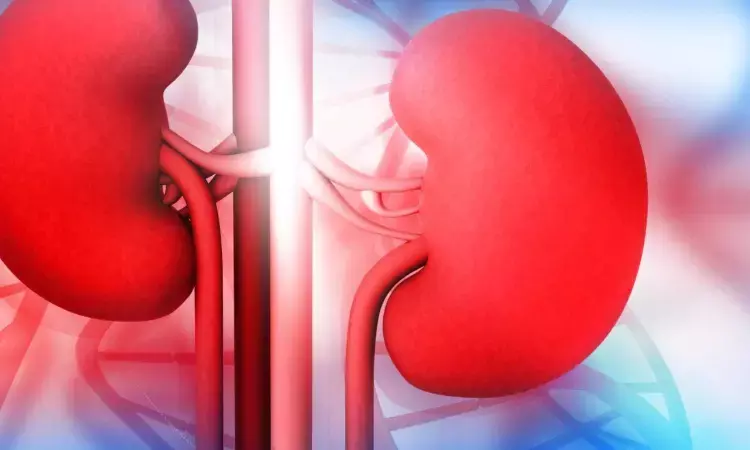- Home
- Medical news & Guidelines
- Anesthesiology
- Cardiology and CTVS
- Critical Care
- Dentistry
- Dermatology
- Diabetes and Endocrinology
- ENT
- Gastroenterology
- Medicine
- Nephrology
- Neurology
- Obstretics-Gynaecology
- Oncology
- Ophthalmology
- Orthopaedics
- Pediatrics-Neonatology
- Psychiatry
- Pulmonology
- Radiology
- Surgery
- Urology
- Laboratory Medicine
- Diet
- Nursing
- Paramedical
- Physiotherapy
- Health news
- Fact Check
- Bone Health Fact Check
- Brain Health Fact Check
- Cancer Related Fact Check
- Child Care Fact Check
- Dental and oral health fact check
- Diabetes and metabolic health fact check
- Diet and Nutrition Fact Check
- Eye and ENT Care Fact Check
- Fitness fact check
- Gut health fact check
- Heart health fact check
- Kidney health fact check
- Medical education fact check
- Men's health fact check
- Respiratory fact check
- Skin and hair care fact check
- Vaccine and Immunization fact check
- Women's health fact check
- AYUSH
- State News
- Andaman and Nicobar Islands
- Andhra Pradesh
- Arunachal Pradesh
- Assam
- Bihar
- Chandigarh
- Chattisgarh
- Dadra and Nagar Haveli
- Daman and Diu
- Delhi
- Goa
- Gujarat
- Haryana
- Himachal Pradesh
- Jammu & Kashmir
- Jharkhand
- Karnataka
- Kerala
- Ladakh
- Lakshadweep
- Madhya Pradesh
- Maharashtra
- Manipur
- Meghalaya
- Mizoram
- Nagaland
- Odisha
- Puducherry
- Punjab
- Rajasthan
- Sikkim
- Tamil Nadu
- Telangana
- Tripura
- Uttar Pradesh
- Uttrakhand
- West Bengal
- Medical Education
- Industry
Dapagliflozin reduces hospitalization risk in CKD patients regardless of diabetes status

Israel: SGLT2 inhibitor dapagliflozin may reduce the hospitalization risk due to any cause in patients with CKD (chronic kidney disease) irrespective of the presence or absence of type 2 diabetes, according to findings from a post hoc analysis of the DAPA-CKD trial. The study was featured in the Annals of Internal Medicine on Dec 6 2022.
Acute hospitalizations are frequent in CKD patients and often result in decreased health-related quality of life (HRQOL) and increased care costs. Meir Schechter, Hebrew University of Jerusalem, Jerusalem, Israel, and colleagues aimed to determine the impact of dapagliflozin on first and subsequent hospitalizations and all (first and subsequent) hospitalizations and investigate effects on cause-specific hospitalizations.
For this purpose, the researchers conducted a post hoc analysis of a DAPA-CKD, a double-blind, randomized, placebo-controlled clinical trial. The study was conducted across 386 ambulatory practice sites in 21 countries from Feb 2 2017, through Jun 12 2020. The study included adults with an eGFR (estimated glomerular filtration rate) of 25 to 75 mL/min/1.73 m2 and a urinary albumin–creatinine ratio (UACR) of 200 to 5000 mg/g, with and without type 2 diabetes (T2D). They were randomized in a ratio of 1:1 to receive 10 mg once daily dapagliflozin or a matching placebo.
The authors determined the effects of dapagliflozin on all hospitalizations, first hospitalizations for any cause, and cause-specific (first and recurrent) hospitalizations. Reasons for admission were evaluated using the reported system organ class. Hospitalizations were assessed using the Lin–Wei–Yang–Ying method for all hospitalizations or death, Cox proportional hazards regression models for first hospitalization and negative binomial models for cause-specific hospitalizations.
The authors reported the following findings:
- The study included 4304 patients (mean age, 61.8 years; 33.1% women).
- During a median follow-up of 2.4 years, 2072 hospitalizations were reported among 28.4% of participants.
- Compared with placebo, dapagliflozin reduced the risk of a first hospitalization (hazard ratio, 0.84) and all hospitalizations or death (rate ratio, 0.79).
- The authors did not observe any evidence that dapagliflozin effects on first and all hospitalizations varied by baseline presence of type 2 diabetes.
- Dapagliflozin, compared to placebo, reduced the admissions rate due to renal and urinary disorders, cardiac disorders, metabolism and nutrition disorders, and neoplasms.
"These results underscore additional benefits of dapagliflozin beyond those seen for kidney and cardiovascular events, all-cause and cause-specific mortality, eGFR slope and albuminuria and should be considered for evaluating the totality of evidence favouring provision of dapagliflozin to CKD patients," the researchers wrote.
To conclude, dapagliflozin reduced hospitalization risk for any cause in CKD patients regardless of diabetes patients.
Reference:
Schechter M, Jongs N, Chertow GM, Mosenzon O, McMurray JJV, Correa-Rotter R, Rossing P, Langkilde AM, Sjöström CD, Toto RD, Wheeler DC, Heerspink HJL. Effects of Dapagliflozin on Hospitalizations in Patients With Chronic Kidney Disease : A Post Hoc Analysis of DAPA-CKD. Ann Intern Med. 2022 Dec 6. doi: 10.7326/M22-2115. Epub ahead of print. PMID: 36469914.
Dr Kamal Kant Kohli-MBBS, DTCD- a chest specialist with more than 30 years of practice and a flair for writing clinical articles, Dr Kamal Kant Kohli joined Medical Dialogues as a Chief Editor of Medical News. Besides writing articles, as an editor, he proofreads and verifies all the medical content published on Medical Dialogues including those coming from journals, studies,medical conferences,guidelines etc. Email: drkohli@medicaldialogues.in. Contact no. 011-43720751


